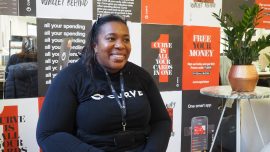Being black in the financial services industry
As Maya Angelou once said, “the more you know of your history, the more liberated you are”. With Black History Month UK coming to a close, FinTech Futures highlights some of the stories from individuals in the sector from the 1950s to present day.
From having to apply innovative solutions to buying property and saving since no bank would give black people accounts, to the inherent underlying racism faced in the hiring process. Here, Natalie Foster, Scrum Master at Curve, relays her experience of being black and British in the UK banking industry and how fintechs are challenging the status quo – but there is still room for growth.
1956
In 1956, a young 21-year-old Jamaican was sold the dream. England was the promised land – a place where the streets were paved with gold, cities had hundreds of jobs oozing with potential, education and opportunities to make money for family back home.
Following her own dream, my mother left the Caribbean and came to London, along with thousands of others to become a nurse, arriving on a British passport before Jamaica gained independence from Britain in 1962.
Heartbreakingly, it wasn’t long before the dream collapsed. Yes, there was work and you could go to school, but there was horrific racism. She wasn’t welcome here.
No blacks, no banks
For so many, getting accommodation in London was impossible. There were no flats like we know now and often the only available options rooms up for rental in shared houses. Even more depressingly, even though vacant rooms were plentiful, landlords would hang out vacancy signs that read “NO BLACKS, NO IRISH, NO DOGS”.
It was also a time when bank accounts could only be obtained by referral or recommendation, which was almost impossible to get without a landlord. As an immigrant, with no credit history, in a foreign country, you were simply not trusted. Even with a referral from a landlord, you still were denied a bank account.
It was a catch-22 situation. Bank accounts were just not something you could attain with black skin, because even though you were working, you were deemed too poor and not a good enough investment into the system.
So instead of relying on the banking system, immigrants relied on each other. The only way to save up a deposit in order to have a chance of buying and gaining any trust was by being part of a pardner – when a group of people got together and saved, one would be the banker and every month everyone would give the same agreed amount and draw out their hand which could then be used as a deposit for a mortgage.
1999
In 1999, I was a 19-year-old who landed the kind of job my parents could only have dreamed of; I was going to work for a bank. Things had come a long way from the dark days of the 1950s and my parents were so proud. It seemed that more companies were focusing on ethnicity and diversity, but I learned this was merely the façade of change to hide the inherent problems people of colour faced in the banking sector than any real change in attitude or progress.
From a young age I was always told you had to play the game. The survival I was taught was how to fit into the corporate culture of an organisation that is systematically white, that not so long ago would not give us a bank account.
I very quickly realised that I had to change who I was to fit in to the ‘white’ work culture in the banking sector if I wanted to progress. This is because all images of black people have been modelled on the white European standards of beauty. Hair straight, formal dress and pale make-up. I would love to have seen just one photo of a black woman in dreadlocks.
Not only did I realise that I had to pretend to fit in their culture to get in, I also realised that being myself did not conform to their measures of professionalism.
Anytime I attempted to speak up about anything, my manner was deemed not good enough compared with my white colleagues. I realised that if I wanted to progress in my career in finance, my best bet was to stay silent. They were never interested in what black people had to say after all, and I felt that I was only there to make up the numbers.
I observed as executive after executive walked into the bank. Each one a white male. Afterall, all major company decisions came from white males, and we were all made to feel like we owe them something, like we should bow down to them as if they were kings, all the time watching what I said – if I could say anything at all.
On my breaks, older people would talk to me but never actually try to get to know me. I guess for them this was what being a diverse culture was about. But questions never extended beyond what country my parents came from – “so…errr…what part of Africa are you from?” (that’s where all black people come from, right!?).
Because I worked in more than one bank, I started to pick up on repeating patterns and trends. It soon became very apparent that those people of colour who played the game well were often fast tracked to be a manager. Credit where credit is due, but this was all just a part of their tokenistic diversity program to get more people in higher positions. It was a very carefully controlled process and you were made to feel very lucky and fortunate if this happened to you. It was also a process which was limited – capped to give the illusion of progression, but ultimately ensure that no person of colour was able to get much further than their mid-level position.
All of the real exec roles and high-power positions went to white males, very very few women progressed through to the next stage. Being a black female, the odds were stacked against me, so I left banking. The corporate life was not for me.
Fast forward to present day – fintechs are born
For the first time in my life can I actually throw everything I was taught to survive out of the window and being myself has actually become an option.
Interviewing in start-ups was different, firstly you actually didn’t need a suit. Strange at first but then it made me feel that they actually wanted to get to know me. In my interview, the people across the table were casual too. It was more of a conversation which made it seem like they were more interested in me. It was not just about whether I would fit into the culture of their workplace, but I had a chance to see if it was also for me.
Whenever I go for an interview, I always do a quick scan of the office and ask myself ‘are there any other people like me?’. I have turned down roles when I see that I would literally be the only black person in the entire office. I’m not trying to repeat primary school at this age. But diversity in fintech is different. There are so many cultures, and so many people from around the world, it’s like a new world, a great one – one where everyone has a voice and together you drive the business principles. Jobs are based on skill, not just quotas and they want to learn about every culture and how to empower people to challenge the status quo.
The concern
Start-ups do have some work to do in getting more women and people of colour into engineering and having more people from the ‘Black, Asian and Minority Ethnic (BAME) community in leadership positions. However, they’ve made a great start in setting the precedence of diversity.
My challenge to the fintech community is this: as companies in the sector scale and grow, how will they break the cycle of old and build a culture loyal to the diverse roots from which it sprung? As companies become more corporate, they are likely to model themselves on similar companies that have grown and sustained their growth over decades.
My fear is that if fintechs follow the precedent set by banks, this cycle will never end. The banking model is made by white men for white men and I want to continue to have a voice.
What’s the answer?
I would argue that as fintechs scale, the positive elements of start-up culture need to remain.
Corporates organise themselves by having a top-down approach. Decisions are made by the top white male, with it being virtually impossible to be heard from the bottom up.
Start-ups have fostered a more collaborative and inclusive approach. This is a much harder model to follow as companies scale but is needed if they want to keep going in the right direction.
Organisation principles should be discussed and agreed upon by all of the people who want to contribute in the organisation – not scoped out on some exec table for the whole organisation to follow. The exec table should consistently integrate the people doing the day-to-day work. And there should be more CEOs from all backgrounds, not just a majority of white British males.
This would create a different tone of voice – one that doesn’t alienate in internal comms and encourages a more diverse approach to business and communication. Start-ups have made great strides in changing the industry, but as they scale, they should not lose the essence of what has made them a success. Fintechs can continue to scale without feeling they have to copy exactly the same model established companies have followed. Scale without compromise.
This is your opportunity to break the mould.
By Natalie Foster, Scrum Master at Curve
















































This story captures the struggle of our parents when they first arrived in Britain. Despite all their struggles we have come a long way but racism and envy still exists in today’s society.